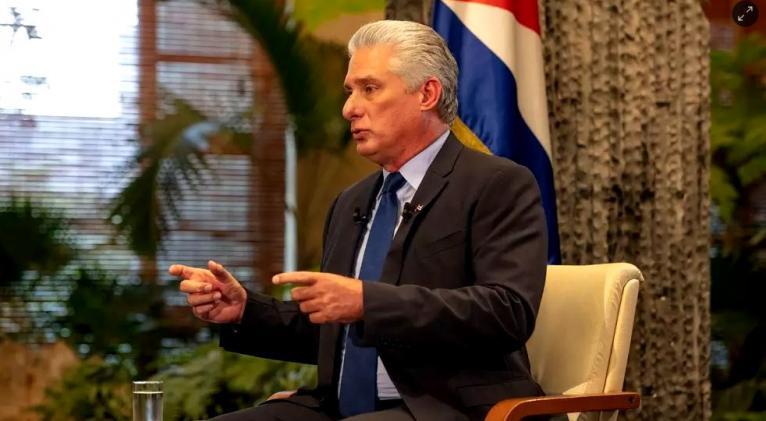Díaz-Canel: “Biden government opted to remain faithful to the aggressive approach championed by Trump” (III)
especiales

Cuba, a nation of slightly over 11 million inhabitants, is always making headlines. However, we do not usually contact their leaders. Miguel Díaz-Canel, the first President born after the Cuban Revolution, granted an interview to *El Público*, his first interview ever to a Spanish media since he came to power. He talked about the island’s current affairs in an interview arranged in Havana, which was then answered in writing.
The Cuban president refers to the conflict underlying behind the accusation of Cuba sponsoring terrorism, denounces the similarity of the anti-Cuban policy of Biden and Trump, explains the country’s economic situation post-pandemic era and analyzes its recent meetings with Vladimir Putin and Xi Jinping.
The Covid crisis especially affected countries dependent on tourism. This is the case of Spain or Cuba. In Spain, tourism is recovering. However, I have the perception that it is being a slow recovery process in Cuba. What is the economic situation of the country after the impact of Covid on the Cuban economy?
Tourism is a strategic sector for the Cuban economy. In the years from 2015 to 2019, the average growth rate of our economy was 1.8%, while tourism did so at 5.8%, the second most dynamic rate after construction.
Due to its financial contributions to other sectors of the economy, which participate in 60% of tourism purchases, which also favors import substitution, it is considered a dynamic factor in the rest of the country's economic sectors, including the activities of the non-state forms
of management.
And it could be said that so far this century, until 2019, the results of this economic activity in the country confirmed that it was the best choice to prioritize its development.
Then the Covid-19 pandemic sprouted and tourism, globally, suffered its biggest crisis in 2020. One piece of information would suffice to illustrate the drop: worldwide travel fell by 72% compared to the previous year.
Cuba, which had started 2020 with an acceptable performance -over 981,900 travelers in the first quarter alone-, is forced to decree a border closure on March 24.
The statistics bring us back to the 1997 level, a setback of 23 years.
During most of 2021 (until November 15), the border closure remained in place. The health of the people was the priority and the country turned to the search for vaccines and treatments, aware that, as a consequence of the reinforced blockade, the only safe solutions would be those that we found with our scarce resources and the abundant talent formed by the Revolution.
I say all this because Cuba's performance in tourism cannot be compared with that of other nations. The challenge that affects all states, as a consequence of the spread of the pandemic, in our case is multiplied by another pandemic that still has no vaccine: six decades of blockade, plus 243 measures, mostly aimed at undermining the economy as a whole, and tourism in particular. Some of these measures tightened during the health emergency caused by the pandemic, with a devastating impact on our people.
I am not saying that we do not have efficiency problems, nor am I denying that we need profound transformations in a sector so sensitive to global problems. But without a doubt, there is a before and after the Covid-19 pandemic and the opportunistic reinforcement of the blockade in this context, which has negatively affected a performance that was growing steadily.
The results in 2018 are there, with its historical record of visitors. That year, 822,464 travelers were welcomed by sea, 17.4% of the 4,711,900 total who visited Cuba. Then, the 243 measures dictated by the Administration of Donald Trump began to appear, aiming at dismantling the flexibility of travel to Cuba, ban the arrival of cruise ships and deprive Cuba of any solution to overcome the global crisis in course.
These measures, maintained by the Biden administration, along with the arbitrary inclusion of Cuba on the list of countries that sponsor terrorism, feed the permanent media campaign against our country and impact all sectors of the Cuban economy and society, but, particularly, it is aimed at harming tourism.
We are not only the off-limits country for American tourists, who consider themselves citizens of the "free world." As of 2021, the ESTA visa is no longer valid for European citizens to enter the United States. If they stop by Cuba, they are required to apply for a regular visa. Another blow, another stone in the way of the Cuban economy to recover.
When I talk about perversity, I am talking about policies like that. Nothing points to that policy to end anytime soon. Our decision is to jump over the blockade and move on.
Read More: Díaz-Canel: “Biden government opted to remain faithful to the aggressive approach championed by Trump” (I)
Read More: Díaz-Canel: “Biden government opted to remain faithful to the aggressive approach championed by Trump” (II)
Translated by Sergio A. Paneque Díaz / CubaSí Translation Staff














Add new comment